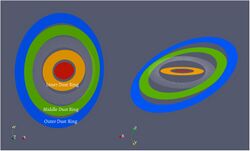Astronomy:Circumtriple planet

A circumtriple planet is a celestial mass that is hypothesized to be orbiting not only a single star but three stars at the same time.[1] Scientists observing the star system GW Ori, which is a huge disk of dust and gases about 1,300 light years away from Earth, suspect that there may be a circumtriple planet orbiting the three stars.[2] They observed a gap in the vast dust cloud and they hypothesize that there may be a planet in this gap.[2] The planet itself has not been seen but its influence may explain gravitational oddities within the star system.[3] If so, this may be the first known example of a circumtriple planet in the universe.[4]
By using computer modeling, some scientists believe that a Jupiter-sized planet may be able to explain the star system's rings and strange behavior, according to one account.[4] If a circumtriple planet exists, it will be an extremely rare phenomenon in the universe.[4] It could add to human understanding of how planets form.[3]
Fiction
A circumtriple planet is prominently featured in the Remembrance of Earth's Past book series. In the series, the planet of Trisolaris orbits a three-star system, and the chaotic nature of the system drives the native species of the planet to seek refuge on Earth, which has a comparatively more "stable" one-star system.[5]
References
- ↑ Kelly Kizer Whitt (October 1, 2021). "Circumtriple planet suspected: a planet orbiting 3 stars". EarthSky.org. https://earthsky.org/space/circumtriple-planet-3-stars/. Retrieved October 6, 2021. "...The suspected planets are not the first found in triple star systems. But planets found in those other systems orbited just one of the stars, not all three stars...."
- ↑ Jump up to: 2.0 2.1 Jonathan O’Callaghan (September 28, 2021). "This May Be the First Planet Found Orbiting 3 Stars at Once: It’s called a circumtriple planet, and evidence that one exists suggests that planet formation is less unusual than once believed.". The New York Times. https://www.nytimes.com/2021/09/28/science/triple-sun-planet.html. Retrieved October 6, 2021. "...“It may be the first evidence of a circumtriple planet carving a gap in real time,” said Jeremy Smallwood from the University of Nevada, Las Vegas, lead author of the new paper...."
- ↑ Jump up to: 3.0 3.1 University of Nevada (October 2, 2021). "Astronomers may have discovered first planet to orbit 3 stars: Potential discovery of a circumtriple planet has implications for bolstering our understanding of planet formation". Science Daily. https://www.sciencedaily.com/releases/2021/10/211002123017.htm. Retrieved October 6, 2021. "...In a distant star system -- a mere 1,300 light years away from Earth -- researchers may have identified the first known planet to orbit three stars...."
- ↑ Jump up to: 4.0 4.1 4.2 Brandon Specktor (October 1, 2021). "Exceptionally rare planet with three suns may lurk in Orion's nose: A Jupiter-sized world may be kicking up dust in the triple-star system GW Ori.". Live Science. https://www.livescience.com/triple-star-planet-orion-simulations. Retrieved October 6, 2021. "...There's now even more evidence that a bizarre star system perched on the constellation Orion's nose may contain the rarest type of planet in the known universe: a single world orbiting three suns simultaneously...."
- ↑ Liu, Cixin (2008). The Three Body Problem. Chongqing Press. p. 1. ISBN 978-7-5366-9293-0. https://en.wikipedia.org/wiki/The_Three-Body_Problem_(novel).
Further reading
- GW Ori: circumtriple rings and planets, Jeremy L. Smallwood, Rebecca Nealon, Cheng Chen, Rebecca G. Martin, Jiaqing Bi, Ruobing Dong, Christophe Pinte, 20 Sep 2021
 |


